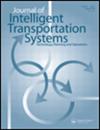Operational planning of integrated urban freight logistics combining passenger and freight flows through mathematical programming
IF 2.8
3区 工程技术
Q3 TRANSPORTATION
Journal of Intelligent Transportation Systems
Pub Date : 2023-10-23
DOI:10.1080/15472450.2023.2270409
引用次数: 0
Abstract
AbstractRecently, more environmentally friendly urban logistics (UL) services have emerged based on the integration of freight deliveries into passenger bus networks to perform UL activities within cities. The aim is to reduce the number of combustion powered vehicles operating within cities, thus improving the city quality of life in terms of pollution, noise, traffic congestion etc. This paper addresses the operational planning of an UL service where freight is dropped by clients at bus hubs located outside the city center, transported by buses to one of their stops located in the city center, and delivered to the destination address by a last mile operator (LMO). To support the operational planning of the service covering the entire logistics process (from the reception of freight delivery requests until the delivery of the requests on their destination), five operational objectives are considered and, for each objective, an Integer Linear Programming (ILP) model is proposed. The objectives cover the perspectives of the bus network operator and of the LMO and some objectives address the robustness of the operational planning solutions to failures. Additionally, five operational planning cases of practical interest where two of the previous objectives are lexicographically optimized are also addressed including a description of how they are solved with the proposed ILP models. We demonstrate the merits of the different operational planning methods with different generated instances whose characteristics allow the assessment of the impact of different parameters on the results obtained by the proposed models when solved with a standard solver.Keywords: integration of passenger and freight transportationmathematical modelsoperational planningurban logistics Disclosure statementNo potential conflict of interest was reported by the author(s).Additional informationFundingThis work was co-financed by the European Regional Development Fund (FEDER) through COMPETE 2020 (Operational Program for Competitiveness and Internationalization) through the project SOLFI - Urban logistics optimization system with integrated freight and passenger flows (POCI-01-0247-FEDER-039870). The work was also supported by the research unit Governance, Competitiveness and Public Policy (UIDB/04058/2020) and by Algoritmi Research Center (UIDB/00319/2020), funded by national funds through FCT.基于数学规划的客货流一体化城市货运物流运行规划
摘要近年来,更多的环境友好型城市物流(UL)服务出现了,其基础是将货物交付整合到客运巴士网络中,在城市内执行UL活动。其目的是减少城市内燃烧动力车辆的数量,从而在污染、噪音、交通拥堵等方面改善城市生活质量。本文讨论了一种UL服务的运营规划,在这种服务中,货物由客户在位于市中心以外的公共汽车枢纽放下,由公共汽车运送到位于市中心的一个站点,并由最后一英里运营商(LMO)交付到目的地地址。为了支持覆盖整个物流过程(从接收货运交付请求到将请求交付到目的地)的服务的业务规划,考虑了五个业务目标,并为每个目标提出了整数线性规划(ILP)模型。目标涵盖了总线网络运营商和LMO的视角,一些目标涉及运营计划解决方案的鲁棒性。此外,还讨论了五个具有实际意义的操作规划案例,其中两个先前的目标是按字典顺序进行优化的,包括如何使用拟议的ILP模型解决这些问题的描述。我们用不同的生成实例证明了不同的作战规划方法的优点,这些实例的特点允许评估不同参数对用标准求解器求解所提出模型得到的结果的影响。关键词:客货运输一体化数学模型运营规划城市物流披露声明作者未报告潜在利益冲突本工作由欧洲区域发展基金(FEDER)通过竞争2020(竞争力和国际化运营计划)项目SOLFI -综合货运和客流的城市物流优化系统(poci -01-0247-联邦-039870)共同资助。这项工作还得到了治理、竞争力和公共政策研究单位(UIDB/04058/2020)和算法研究中心(UIDB/00319/2020)的支持,该研究中心由FCT提供的国家基金资助。
本文章由计算机程序翻译,如有差异,请以英文原文为准。
求助全文
约1分钟内获得全文
求助全文
来源期刊
CiteScore
8.80
自引率
19.40%
发文量
51
审稿时长
15 months
期刊介绍:
The Journal of Intelligent Transportation Systems is devoted to scholarly research on the development, planning, management, operation and evaluation of intelligent transportation systems. Intelligent transportation systems are innovative solutions that address contemporary transportation problems. They are characterized by information, dynamic feedback and automation that allow people and goods to move efficiently. They encompass the full scope of information technologies used in transportation, including control, computation and communication, as well as the algorithms, databases, models and human interfaces. The emergence of these technologies as a new pathway for transportation is relatively new.
The Journal of Intelligent Transportation Systems is especially interested in research that leads to improved planning and operation of the transportation system through the application of new technologies. The journal is particularly interested in research that adds to the scientific understanding of the impacts that intelligent transportation systems can have on accessibility, congestion, pollution, safety, security, noise, and energy and resource consumption.
The journal is inter-disciplinary, and accepts work from fields of engineering, economics, planning, policy, business and management, as well as any other disciplines that contribute to the scientific understanding of intelligent transportation systems. The journal is also multi-modal, and accepts work on intelligent transportation for all forms of ground, air and water transportation. Example topics include the role of information systems in transportation, traffic flow and control, vehicle control, routing and scheduling, traveler response to dynamic information, planning for ITS innovations, evaluations of ITS field operational tests, ITS deployment experiences, automated highway systems, vehicle control systems, diffusion of ITS, and tools/software for analysis of ITS.

 求助内容:
求助内容: 应助结果提醒方式:
应助结果提醒方式:


